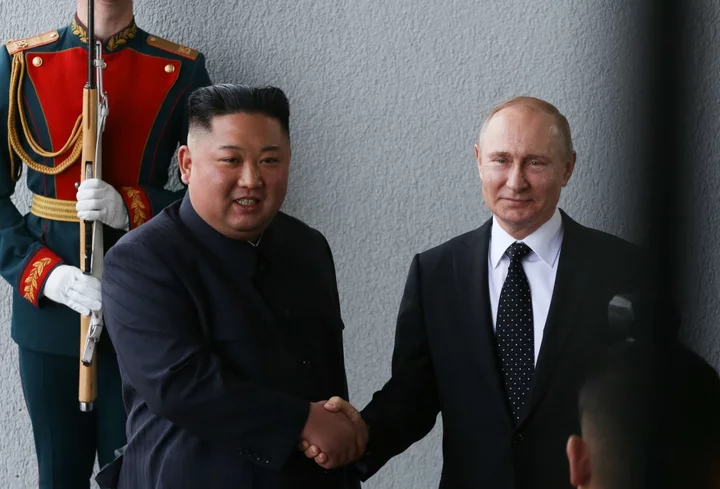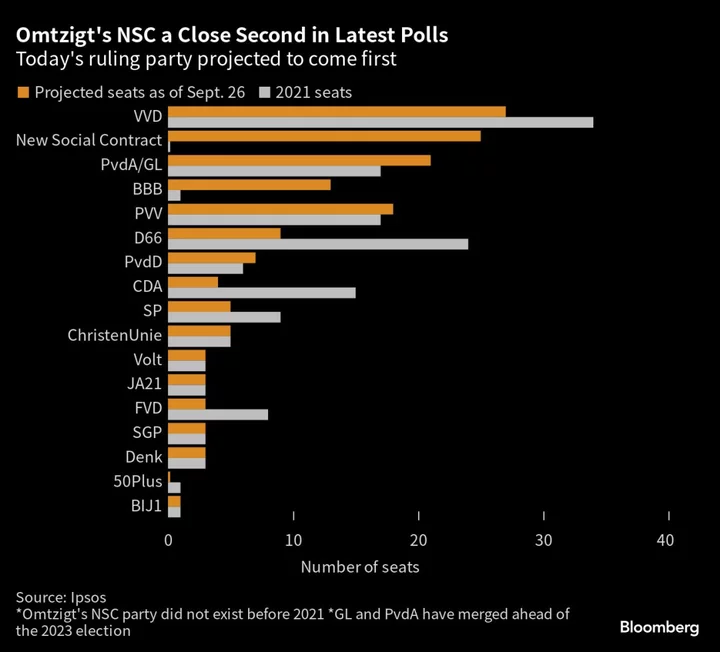North Korea claimed it successfully put a spy satellite into orbit after two attempts earlier this year ended in failure, as leader Kim Jong Un pledged to place more in the sky to keep an eye on US forces in the region.
Kim presided over the Tuesday launch, the official Korean Central News Agency reported, adding the country wants to fire off several additional spy satellites within a short period of time. There has been no confirmation of a successful deployment from the US, Japan or South Korea, which have all been closely watching the launch and are working with each other to evaluate the event.
Kim “congratulated all the cadres, scientists and technicians” who helped in the launch that “made a great contribution to enhancing the Republic’s war deterrent,” KCNA said, adding the deployment is within the legitimate rights of the country to strengthen its self-defense.
It released images of the launch Wednesday that showed its rocket blasting off under night skies. Kim can be seen watching the launch and then smiling profusely as he stood with technicians from his space agency.
The White House condemned the launch and is working with allies to assess the situation, National Security Council spokesperson Adrienne Watson said in a statement. “This space launch involved technologies that are directly related to the DPRK intercontinental ballistic missile program,” Watson said, referring to North Korea by the abbreviation of its formal name.
South Korea’s Joint Chiefs of Staff said in a statement the rocket was launched Tuesday in a southerly direction. It was fired off at about 10:43 p.m. from North Pyongan province, the JCS said in a message to reporters.
While officials in Seoul believe a North Korean spy satellite would be rudimentary at best, it could help Pyongyang refine its targeting as it rolls out new missiles designed to deliver nuclear strikes in South Korea and Japan, which host the bulk of America’s military personnel in the region.
“It will take probably a few hours to a day or so for US Spacecom, as well as other commercial space situational awareness organizations, to detect and track the satellite, if it’s up there,” said Malcolm Davis, senior analyst at the Australian Strategic Policy Institute.
“If it’s in a stable orbit, then North Korea will likely seek to follow through with additional launches — if indeed they have solved the problems they were having with launch technologies.”
South Korea responded to the launch by suspending parts of a 2018 deal with North Korea to reduce tensions on their border. The Cabinet approved a plan to restore reconnaissance and surveillance activities from Wednesday that were halted under the agreement.
The satellite is likely quite small, making it difficult to track by radar, given its size, speed and orbital altitudes, said Lance Gatling of the Tokyo-based aerospace consultancy Nexial Research.
Leader Kim has made placing multiple spy satellites in orbit a priority and went to Russia in September to meet President Vladimir Putin, who pledged to assist Pyongyang with its space program ambitions.
Read More: Kim’s Trip to Russia May Help Him Put Spy Satellites in Orbit
Japan issued a warning to people on its southern island of Okinawa to seek shelter minutes after the launch, which was later lifted after the rocket passed overhead.
Prime Minister Fumio Kishida said he “condemned the North Korean launch in the strongest terms,” and Japan would work with the US and South Korea to deal with North Korea.
North Korea’s first attempt this year to put a spy satellite in orbit took place on May 31 and the rocket failed a few minutes into flight when the second stage engine did not ignite. South Korea salvaged the rocket from international waters in the Yellow Sea, giving it a rare look at the technology North Korea has available for its rocket program.
Pyongyang tried and failed again to put a spy satellite into orbit in late August, saying this time the rocket had trouble at its third stage.
Prior to the latest launch, North Korea had tried seven times over the past 25 years to deploy a satellite. Five of the missions crashed into the sea and two put objects in space, albeit with questionable operating status.
The assistance from Putin could help North Korea turn the corner, offering Kim the chance to tap into a space program that’s more than half a century old and has a proven track record. Russian technology could eventually be used to increase the surveillance capabilities of North Korea’s satellites and provide more power to the country’s rockets — allowing them to carry larger payloads into space.
US Secretary of State Antony Blinken said during a visit to Seoul in November that North Korea is sending munitions to Russia for use in Putin’s assault on Ukraine. In return, Moscow is providing technology and support for Kim’s military programs, he said.
The US for months has accused Kim of sending artillery shells and rockets that can work with the Soviet-era weapons that the Kremlin has deployed on the front lines.
North Korea is barred by UN Security Council resolutions from conducting ballistic missile tests. The US and its partners have warned that technology derived from North Korea’s space program could be used to advance its ballistic missiles and warned any help Putin offers Kim would violate measures that Russia had voted to approve.
--With assistance from Shinhye Kang, Sangmi Cha, Max Zimmerman, Se Young Lee, Isabel Reynolds, Bruce Einhorn, Seyoon Kim and Philip Glamann.
(Updates with South Korean move on 2018 agreement and comments from experts.)









